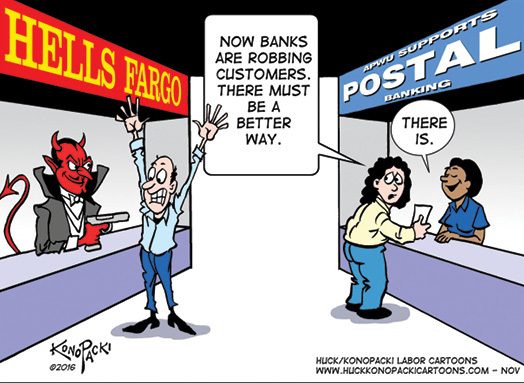Consumer Protections Under Attack
March 1, 2017
(This article first appeared in the March-April 2017 issue of The American Postal Worker magazine.)
After the devastating 2008 financial crisis, Congress passed the Dodd-Frank Act that led to creation of the Consumer Financial Protection Bureau (CFPB). The Bureau has had a significant impact protecting consumers and holding big banks accountable. The CFPB recently fined Wells Fargo $100 million for the illegal practice of secretly opening unauthorized customer accounts. Since the Bureau’s inception, it returned nearly $12 billion to consumers who were cheated or misled by payday lenders, pawn shops and other financial predators. It has taken particular aim at companies that target service members and veterans. 
Not surprisingly, Wall Street is not happy. “For years, the big banks and their allies have launched one shameless attack after another trying to gut the CFPB,” said Sen. Elizabeth Warren (D-MA) who helped create the agency.
Proposed legislation to significantly weaken the CFPB is now pending in both houses of Congress. Also, Steven Mnuchin, Treasury Secretary nominee, is in favor of destroying at least certain aspects of the Dodd-Frank Act, which could eliminate the agency itself, according to the Washington Post.
Payday Lenders on the Run
With proposed rules to curb the abuses of payday lending under attack in Washington, many states and localities are stepping up. In the 2016 legislative session, 25 states addressed legislation regarding payday lending, according to the National Council on State Legislatures. Four of those states – Florida, Louisiana, Michigan and Utah – enacted legislation. On Election Day, 75 percent of South Dakota voters approved a ballot measure to cap payday, car title and installment lending rates at 36 percent annually. The average rate in the state was 574 percent.
The most expensive payday loans in the country are in Ohio, according to a new report by the Pew Charitable Trusts. The typical annual percentage rate (APR) is 591 percent. One in ten Ohioans have used a payday loan, which is nearly twice the national average. Both Republican and Democratic lawmakers in Ohio are planning to renew efforts to curb the abuses in 2017.
Wells Fargo Leads in Overdraft Fees
Wells Fargo is in the news again. The bank leads the industry in overdraft fee revenue. Across the entire banking industry, third quarter 2016 revenue generated by overdraft fees was up by 2.4 percent. At Wells Fargo, overdraft revenue was up 7.5 percent from a year earlier. The CFPB is scheduled to issue rules on overdraft charges in 2017.
 Postal Banking: A Win-Win
Postal Banking: A Win-Win
“The financial industry’s attempt to gut an agency that exists to protect consumers, as well as the recent scandals at Wells Fargo, shows the need for real financial reform and an alternative to the big banks and, of course, postal banking,” said President Dimondstein.
Consumers want, need and deserve access to fair, non-profit and affordable financial services. With more than 30,000 locations across the country, a mission to serve the public and accountability to the people of the United States – rather than shareholders – the U.S. Postal Service can do the job.



